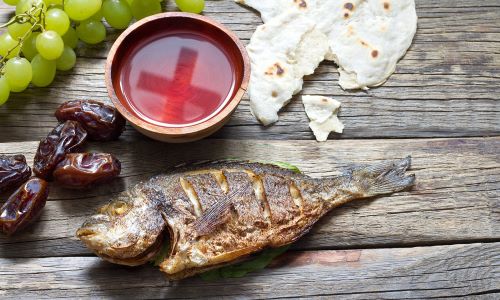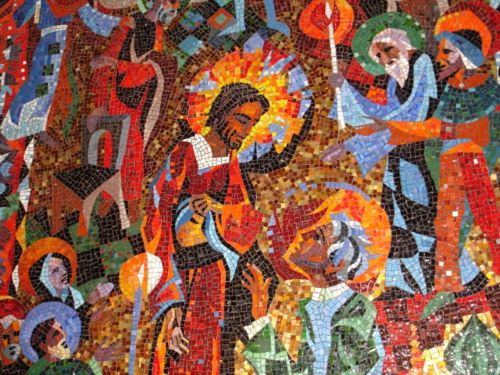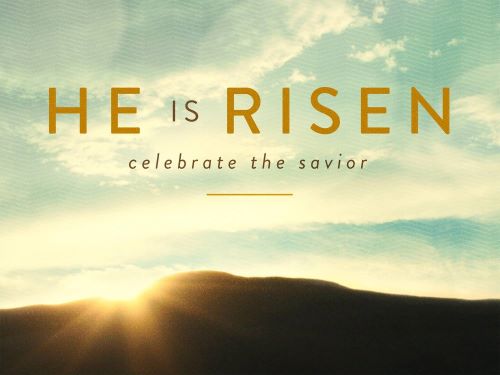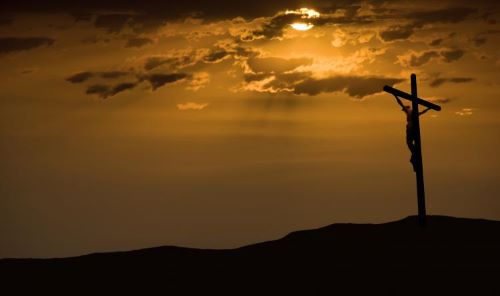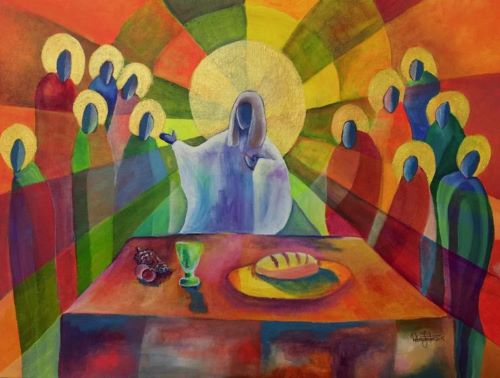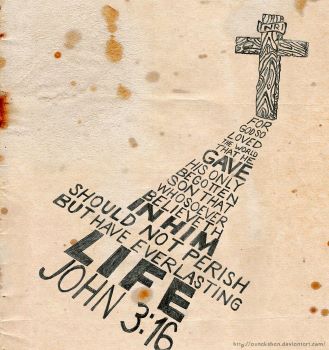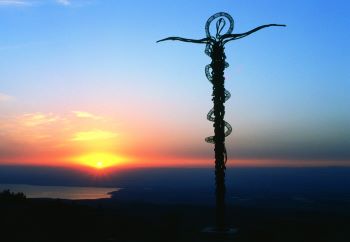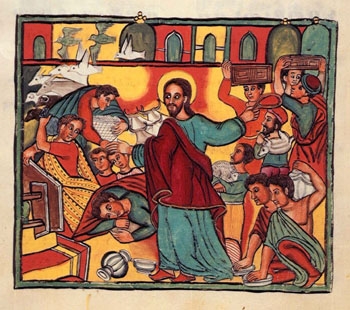Gardens Within Deserts
Year A
Isaiah 11:1-10
Psalm 72:1-7, 18-19
Romans 15:4-13
Matthew 3:1-12
May the words of my mouth O God… speak your truth…
John the Baptist wears symbolic clothing and eats symbolic food… both of which suggest people and processes in Israel’s past… both of which explore the dynamics of repentance… John’s clothing is reminiscent of Elijah’s… in a story from 2Kings (1:1-18)… here’s how… King Ahaziah had been seriously injured in a fall… and sent messengers to ask Baal-zebub… the god of Ekron… whether or not he would recover… but an angel tipped Elijah off… and Elijah intercepted those messengers… and turned them around and told them to ask Ahaziah… somewhat rhetorically… Is it because there is no God in Israel that you are going to inquire of Baal-zebub… the god of Ekron… Therefore you shall not leave the bed to which you have gone… but shall surely die… and when Ahaziah asked them what this man looked like… they said… he was a hairy man… with a leather belt around his waist…
And the Baptist eats inedible locusts and untamed honey… locusts… one of the plagues against Egypt… plagues intended to soften Pharaoh’s heart… but did not… locusts… which symbolized divine judgment… and honey… reminiscent of the scroll God gave Ezekiel to eat… a scroll on which was written… lamentation and mourning and woe… but when Ezekiel ate it… it was as sweet as honey… because the harshness of divine judgement became the sweetness of human fulfillment…
Church consultant Calvin Chinn wrote: The Baptist doesn’t fit the norm of how we picture ordinary people… he knows that the way to the garden of human flourishing is through the desert of self-confrontation… and like so many other people… he is subject to our prejudice and dismissal… and so in appearance as well as in word… John preaches repentance… not as an end in itself… but the first step in a process of fulfillment… a command to reorient ourselves… to turn from our former ways… to change our attitude and perceptions… and of those who come out to hear him… whose hearts do not change… who lack sufficient character… who are challenged to but do not bear fruit worthy of repentance… John indicts as a brood of vipers… John’s command is to act out of awe and reverence… instead of out of being afraid… and reverence begins with a deep understanding of our own limitations…
Fr. John Shea reminds us… that John the Baptist’s vocation… is to lead the heart to the place where God will speak… but too often… for too many people… the city is so noisy with sound and distraction… that we cannot hear God whispering in our heart… in the summer of 1971… I spent three weeks on an archaeological dig in Beersheba… in the desert… and I spent some late afternoons up on top of the Tel… by myself… with only the sound of the wind… and the sounds of my thoughts… and it was the kind of stillness in which one just might hear God…
Now stay with me… I’m going to link together a few passages… that may be why the prophet Hosea wrote in 2:14-15… Therefore I will now allure her… and bring her into the wilderness… and speak tenderly to her… from there I will give her her vineyards… and make the Valley of Achor a door of hope… there she shall respond as in the days of her youth… as at the time when she came out of the land of Egypt… and there’s a backstory to the Valley of Achor… here’s why Isaiah refers to it… Achor means trouble… and the Valley was named Trouble… because Achan… of the Tribe of Judah… stole some objects that belonged to God… objects previously owned by the people of Ai… objects that were dedicated… which means they were intended by God to be completely consumed by fire… objects that belonged to God because God secured Israel’s victory… but Achan took a beautiful mantle from Shinar… and two hundred shekels of silver… and a bar of gold weighing fifty shekels… and buried them in the ground beneath his tent… and as a result… he and his family and his animals were punished by death… but Isaiah says… that the Valley of Trouble will become a Valley of Hope… the same kind of hope… when after four hundred years of slavery… of being oppressed… the Israelites were ready to be God’s people… because they listened…
John listens to God… and baptizes people… washes off the toll of living… returns them to freshness… he pushes them beneath the water… and pulls them out… ready and eager for new breath and for new life… and if this heart leading… this metanoia… this repentance… is engaged in correctly… the baptized will be able to use the Key of David to unlock the experience of Isaiah… the Key of David unlocks the heart… and enables us to perceive the Kingdom of Heaven which is already here… right in front of us…
The first half of today’s reading from Isaiah… is about heart and hope… it describes the qualities of the divine king… who doesn’t judge based on what is seen… or decide based on what is heard… but arbitrates from an unlocked heart… and the second half of the passage describes the kingdom itself… in which there is equanimity and peace… and today’s reading from Romans mentions hope… four times… hope sustains us… because when we find ourselves in a dilemma… when we realize that our own efforts… or those of others… aren’t enough… when we acknowledge the fact that we cannot control the wind… the many variables which inform the outcome of some pressing crisis that’s swirling around us… when we find in ourselves a willingness to acknowledge our human limitations… our powerlessness over the cosmic waters of chaos… we can come back to the waters of baptism… and what they have unlocked for us…
But who has this Key of David… we do… but it works more effortlessly… when the lock of our heart has been oiled with the awe and reverence… and the fear and the respect of the Lord… as individuals… we cannot be replaced… there has never been and there will never be another one of us… and God desires not to diminish our preciousness or our value… God loves us… God wants the best for us… God blesses and forgives us… and invites us over and over again to be God’s co-creators… but God also judges our suitability for the job… God has a plan of fulfillment for this created universe… but God won’t… or can’t always wait for us to be ready… and so when we can’t step up to the plate… when we don’t live into our potential… if we’re not bearing the right kind of fruit… God will find someone who will… and God is so committed to this goal… that if needed… God can even raise up righteous children of Abraham… from stones…
1 Corinthians 13 tells us that: Love never ends… but prophecies will end… tongues will cease… and knowledge will also end… because we know only in part… and prophesy only in part… but when the complete comes the partial will end… and while now we see in a mirror dimly… then we will see face to face… and faith… hope… and love abide… and the greatest of these is love…
Advent reminds us that one day… our faith will become something we see… as we use more and more of our hearts to see God’s Kingdom that’s right in front of us… and our hope will be realized in the Peaceable Kingdom that Isaiah describes… and then we won’t need faith or hope… because in the eternal state… the greatest quality… which is love… will engulf us… and love will never cease… and for that we say… Thanks be to God!

